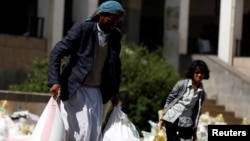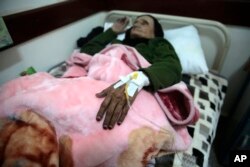The United Nations humanitarian chief said Tuesday that Yemen has become the world’s largest food insecurity crisis, with more than 17 million people struggling daily to get enough to eat.
Stephen O’Brien told the U.N. Security Council that of the 17 million people who are food insecure, nearly 7 million of them are “one step away from famine.”
“What is worse, the threat of famine is driven and exacerbated by conflict,” O’Brien said, speaking of the more than two-year-old war between Yemen's government and Houthi rebels.
O’Brien noted that the country is not facing a drought, a common cause of famine, but that the crisis is entirely man-made.
“If there was no conflict, there would be no descent into famine, misery, disease and death – a famine would certainly be avoidable and averted,” he said.
Spike in food prices
Food prices have surged, leaving a quarter of Yemenis unable to afford provisions at their local markets.
Local food production, especially agriculture and fishing, has been severely disrupted by the fighting. Add to that a de facto blockade on the country’s main commercial port by the government’s Gulf Arab supporters, which is making the delivery of humanitarian aid and fuel extremely difficult.
As hunger spreads, the population becomes more susceptible to disease and the country is now trying to contain a cholera outbreak that O’Brien said has sickened an estimated 60,000 people and killed 500. He said another 150,000 cases of the water-borne disease are projected over the coming six months.
“The scale of this latest outbreak is…a direct consequence of the conflict,” O’Brien said. He praised the U.N. and its humanitarian partners who are working to contain the epidemic. Less than 45 percent of Yemen’s medical facilities are functioning, adding to the challenge.
Political settlement still beyond reach
And there is no political settlement in sight.
“I will not hide from this council that we are not close to a comprehensive agreement,” the U.N. Special Envoy for Yemen Ismail Ould Cheikh Ahmed told council members.
“The reluctance of the key parties to embrace the concessions needed for peace, or even to discuss them, remains extremely troubling,” he said.
Ahmed said he has also failed to get agreement on a deal to avert a military attack on the vital Red Sea port of Hodeidah, which is the main entry point for the majority of the country’s fuel and humanitarian aid.
Meanwhile, over one million civil servants have not been paid their salaries in months, driving families into poverty and adding to the country’s economic crisis.
Even the special envoy has not been immune to first-hand experience of the violence. Last Monday, Ahmed's convoy was attacked in Houthi-controlled Sana'a while traveling from the airport to the United Nations compound. The U.N. has called for an investigation into the incident.











